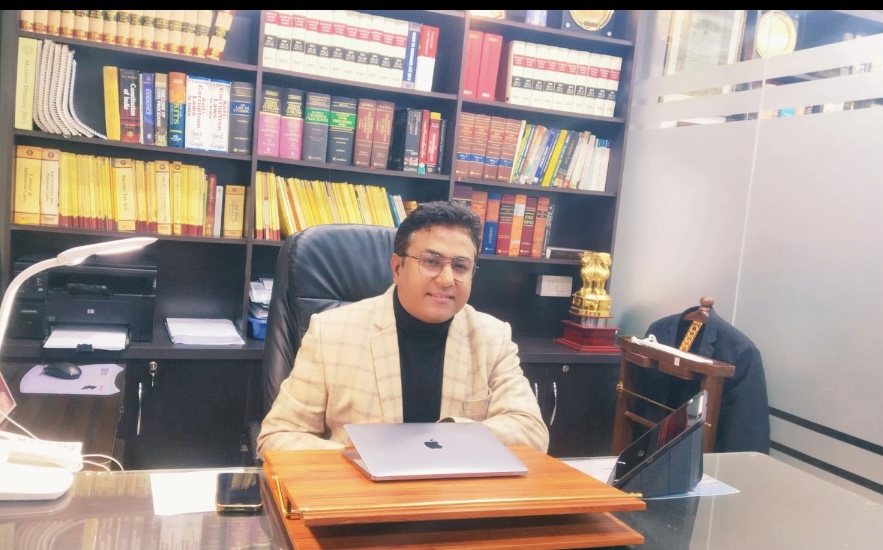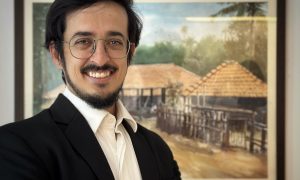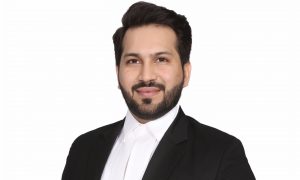This Interview has been published by Pragya Chandni and The SuperLawyer Team

Can you share the journey of how you decided to pursue a career in law, especially with a focus on Government Litigation ?
Firstly I would like to thank Superlawyer for this interview and convey my deep appreciation for their endeavor. Law graduates would find my insights useful while planning their professional journey.
Being the second generation lawyer, law was the obvious choice as I have been watching my father attending court. Also the fact that law is one such mechanism which touches human lives .It is one such avenue which can bring about positive changes in this inequitable world.
I got through the National Law Institute University , (NLIU) Bhopal in 2007.I started my practice at Allahabad High Court. After the elevation of my father as a High Court Judge, I shifted to Delhi to practice at the Supreme Court in 2013. One does not start with government litigation in the formative years . I landed with ‘government panels’ after spending considerable time in private practice. By God’s grace , I have been continuing the work for the past many years before the Supreme Court and different tribunals across Delhi. It’s indeed a privilege to be part of a competent team of government lawyers where I get to work on complex and high profile cases. I have gained considerable experience while representing State Governments and Corporations.
With extensive experience in dealing with both State Governments and Corporations, can you highlight a particular case that has been the most challenging or memorable in your career so far?
I have been extremely fortunate to have worked on a wide range of cases.While every case I argue is close to my heart , but the one that stands out is the service matter in which I appeared as a standing counsel on behalf of the Delhi Transport Corporation before Delhi High Court. An Employee had resigned after rendering 29 years of service.The court was inclined to grant relief on equitable ground. I could successfully convince the court that the word “resignation” and “voluntary retirement” cannot be used interchangeably in the case of an employee and thus not entitled to retiral benefits.
Another satisfying case has been of a gazetted government officer wherein I was able to secure the quashing of criminal proceedings as well as divorce under Article 142 of the constitution from the Supreme Court . There were multiple cases lodged by his wife in different districts.
I have had the opportunity to assist the Senior Advocate/Advocate-on-Record(s) in several high profile cases like CBI autonomy ,Triple talaq Article 370 etc to name a few.
How did your academic background shape your perspective and approach towards practicing law?
Apart from my legal background , I believe my law school NLIU played an important role in shaping my personality.Be it moot court participation or time bound completion of research papers involving rigorous research or internships with top law firms have all contributed to my professional growth . The interdisciplinary approach taught there has also enabled me to develop a broader perspective which is helping me to diversify my practice .No wonder , I never found any hurdles in adapting to the distinct practice culture of the Supreme Court after shifting to Delhi from Allahabad (now Prayagraj) in 2013. I cracked the Advocate-on-Record (AOR) exam in my very first attempt in 2019.
It has been an enriching experience to represent the Government of India ,Uttar Pradesh and Uttarakhand before the Supreme Court of India. I also appear before different High Courts like Allahabad , Chandigarh etc frequently.
You have an LL.M. in Cyber Laws and have published articles in prestigious journals. How has the specialization in Cyber Laws influenced your practice, and what challenges do you often face in this dynamic field?
After some years of practice, I wanted to pursue post-graduation However it was not possible to leave active practice and pursue studies. Coronavirus Pandemic provided me an opportunity to pursue a two year masters’ program in Cyber Laws from School of Law and Legal Studies, Guru Gobind Singh Indraprastha University [GGSIPU], Delhi. These two years not only gave me invaluable insights, but also provided me with an alternative perspective that is going to benefit my career as a lawyer.
E-commerce in India is moving forward by leaps and bounds. With it , there are bound to be cyber crimes.We all have seen critically acclaimed web series ‘Jamtara-Sabka Number Ayega’ where the phishing, a type of cybercrime, is undertaken in an organized manner by the village teenagers . I believe that the role of Artificial Intelligence (AI) in the realm of cyber security looks promising.The challenge remains to be seen in respect of effective implementation of AI systems given the fact that such systems are going to be trained in safeguarding data.
As an Advocate-on-Record, you’ve appeared before various courts and tribunals, including the Supreme Court and High Courts. Could you share some insights into the differences in presenting cases in these forums and how you navigate through them?
I believe the approach varies from court to court.This is due to the fact that the jurisdiction of each court is different . For instance, the Supreme Court is not only the highest court of the land but also the final court of appeal.This mandates lawyers taking a different approach which one would not take before High Court or Tribunal(s). It is like identifying the error committed by Court /Tribunal below and presenting it in a limited time frame before Supreme Court judges. The case with the High Court(s) is different as lawyers have the liberty to argue at length.
Practice in Trial courts involve more procedure laws while Higher courts involve mostly appellate or writ jurisdiction dealing with legal issues relating to substantive law. Facts are the main weapon of choice before the Trial courts while Higher courts deal with nuances of law.However, I would add a caveat. Facts are the backbone of every case irrespective of courts involved and lawyers should always be well versed with them .If left to me , I would say that every case is decided on the facts and law helps in unearthing the truth and reaching at the correct conclusion to promote justice.
Given your interest in writing articles and being invited by universities to judge legal events, how do you balance your advocacy work with these academic pursuits, and how do they complement each other in your professional growth?
Being an Advocate actually provides the satisfaction of directly representing the ‘aggrieved’ before the court. Whereas writing legal articles or mentoring law students reflect my commitment of giving back to the legal fraternity.
Both Advocacy and Academic pursuits might be distinct but they are essentially complementary. Writing articles or mentoring allow me to engage with burning legal topics on a broader scale. It provides me a platform to share my knowledge
and insights with my peers. It would be wrong If I don’t admit that writing brings about an in-depth understanding of the legal principles. Meeting ‘like-minded’ professionals is another advantage.
Thus balancing practice with academic pursuits is challenging but immensely fulfilling.
You’ve worked with different government bodies, including the Government of India and various state governments. What unique challenges or considerations arise when representing government entities compared to private clients?
I have been appearing before the Supreme Court of India , Delhi High Court, NCLT, NCLAT, and NCDRC. With over a decade of experience, I personally feel that the case of Government bodies is often strong legally but lacks either professional advice or proper representation. For instance, crucial evidence is not adduced or documents vital for adjudication of the case are not annexed before the Court/Tribunal(s) .Such instances have led to the dismissal of cases before Supreme Court having financial ramifications.
When entrusted with a case , I try my best to go through the records thoroughly and ensure superfluous claims are nipped in the bud and genuine claims, if any , remain for adjudication. Professional fee offered by the Government bodies is although meager but the volume of cases give consistent opportunity to appear before the Courts which enhances one’s nuanced understanding of law , not to forget court craft.
Private clients on the other hand approach lawyers after taking painstaking research about the reputation one enjoys in the market. I found such clients smart and attentive. But the problem crops up when it comes to managing their
expectation especially at a place like the Supreme Court where the dismissal rate of cases is high at the admission stage.
I have been fortunate enough to get the best of both worlds. It has been so far a transformative experience that has broadened my horizons and equipped me with the skills necessary to handle extremely challenging propositions.
As a Managing Partner of Avika Law Offices LLP, and with reported judgments to your credit, what advice would you offer to law graduates entering the profession, particularly those interested in government litigation ?
My journey from a law student to Managing Partner of Avika Law Offices LLP has been a rewarding experience. I would urge law graduates aspiring to enter this dynamic profession to look for good mentors. It is extremely important to have a good chamber in initial years which lays down a strong foundation. Embrace lifelong learning considering the vastness of law as a discipline. Constant updation is sine qua non .Go for additional qualifications to hone skills .There are no shortcuts in this profession. Always uphold integrity.
Lastly, frequent interaction with peers and legal professionals is a fruitful idea as
It provides both guidance and opportunities in the profession.
Get in touch with Aviral Saxena-

























